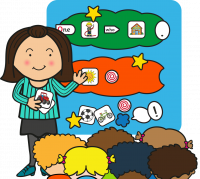Sentence Structure Activities for Key Stage One Classes
As we strive to make learning fun and engaging for our young pupils, one area that requires special attention is sentence structure. By providing activities that focus on sentence building, we can help children develop their writing skills and improve their overall literacy. Here are some exciting activities that you can incorporate into your lessons:
1. Sentence Scramble
 This activity encourages children to rearrange words to form meaningful sentences. Prepare sentence cards with jumbled words on them and ask pupils to put the words in the correct order. You can differentiate the difficulty level by using simple or complex sentences. To make it even more interactive, consider using a timer to see who can complete the task the fastest!
This activity encourages children to rearrange words to form meaningful sentences. Prepare sentence cards with jumbled words on them and ask pupils to put the words in the correct order. You can differentiate the difficulty level by using simple or complex sentences. To make it even more interactive, consider using a timer to see who can complete the task the fastest!
2. Picture Prompts
 Show pupils a picture and ask them to write a sentence describing what they see. (you can use Mighty Writer toolbar tiles for this activity!)
Show pupils a picture and ask them to write a sentence describing what they see. (you can use Mighty Writer toolbar tiles for this activity!)
Encourage them to use descriptive words and correct sentence structure.
This activity not only boosts their sentence-building skills but also enhances their imagination and storytelling abilities.
3. Sentence Builders
Provide pupils with sentence building blocks or word cards. These can include subject cards, verb cards, and object cards. Pupils can then arrange the cards to create complete sentences. This hands-on approach helps pupils grasp the concept of sentence structure in a fun and interactive way.
4. Fill in the Blanks
 This activity involves giving pupils sentences with missing words. They need to fill in the blanks with the correct words to make the sentences grammatically correct.
This activity involves giving pupils sentences with missing words. They need to fill in the blanks with the correct words to make the sentences grammatically correct.
You can provide word banks to support struggling pupils or challenge advanced pupils by omitting more challenging words.
5. Story Chains
In this activity, pupils take turns adding sentences to a growing story. The first pupil starts with an opening sentence, and each subsequent pupil adds a sentence to continue the story. This activity encourages collaboration and helps pupils understand how sentences connect to form a coherent narrative.
6. Sentence Sorting
Prepare sentence cards with mixed-up words and ask pupils to sort them into different categories based on their sentence structure. For example, pupils can sort sentences into categories like questions, statements, or exclamatory sentences. This activity reinforces their understanding of different sentence types.
7. Sentence Detective
 Give pupils a passage or a short story and ask them to identify different sentence structures within it. They can underline or highlight declarative, interrogative, and exclamatory sentences.
Give pupils a passage or a short story and ask them to identify different sentence structures within it. They can underline or highlight declarative, interrogative, and exclamatory sentences.
This activity helps pupils analyse the structure of sentences in a meaningful context.
8. Sentence Puzzles
Create sentence puzzles by cutting sentences into individual words or phrases. Pupils then rearrange the pieces to form complete and grammatically correct sentences. This activity challenges their critical thinking and problem-solving skills while reinforcing sentence structure concepts.
If you have the Mighty Writer resource, why not select a few symbols and image tiles and have your pupils rearrange the tiles to form complete sentences? See how many sentences they can build with the provided tiles.
9. Sentence Race
Divide the class into teams and provide each team with a set of sentence cards. One pupil from each team picks a card and races to form a sentence using the words on the card. The first team to construct a grammatically correct sentence wins a point. This fast-paced game adds an element of competition to sentence structure practice.
10. Sentence Rewrite
Give pupils a set of sentences and ask them to rewrite them using different sentence structures. For example, they can change a simple sentence into a compound sentence or transform an interrogative sentence into an exclamatory sentence. This activity encourages pupils to think creatively and experiment with sentence construction.
Alternatively, if you have the Mighty Writer resource, you can form a sentence on the mat, and ask pupils to develop the sentence further, or change it using symbols or punctuation!
Remember, a solid foundation in sentence structure is crucial for developing strong writing skills. By incorporating these activities into your lessons, you can make sentence structure practice enjoyable and engaging for your key stage one pupils.
Have fun teaching!
How Can Mighty Writer Help?
Mighty Writer is an exciting, visual teaching resource that can transform literacy in your key stage one classroom almost overnight!
With Mighty Writers images, symbols and sentence clouds, children can build, rebuild and rearrange sentences in a variety of genres.
This tool will fill your class with independent, confident and capable writers, by simplifying the process of learning to write.
Ready to learn more? Download our guide below! It will take you through what Mighty Writer is, and how it works!

